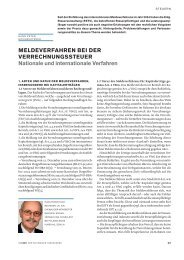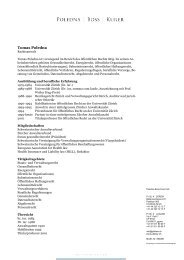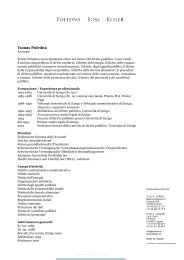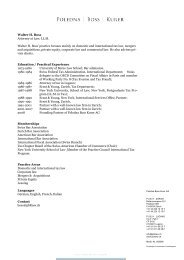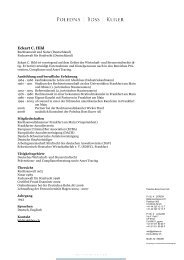Tax on Inbound Investment - Poledna | Boss | Kurer
Tax on Inbound Investment - Poledna | Boss | Kurer
Tax on Inbound Investment - Poledna | Boss | Kurer
Create successful ePaper yourself
Turn your PDF publications into a flip-book with our unique Google optimized e-Paper software.
<str<strong>on</strong>g>Tax</str<strong>on</strong>g> <strong>on</strong> <strong>Inbound</strong> <strong>Investment</strong><br />
in 33 jurisdicti<strong>on</strong>s worldwide<br />
C<strong>on</strong>tributing editors: Peter Maher and Lew Steinberg<br />
®<br />
2012<br />
Published by<br />
Getting the Deal Through<br />
in associati<strong>on</strong> with:<br />
A&L Goodbody<br />
Abraham & Co (Solicitors, Advocates and Notary Public)<br />
ADMD Law Firm<br />
Anzola Robles & Associates<br />
Berwin Leight<strong>on</strong> Paisner LLP<br />
BLP Abogados<br />
BMR Advisors<br />
Boga & Associates<br />
Borden Ladner Gervais LLP<br />
Carey y Cía<br />
CMS Bureau Francis Lefebvre<br />
CMS Hasche Sigle<br />
CMS Reich-Rohrwig Hainz<br />
CMS Reich-Rohrwig Hainz doo<br />
Doria, Jacobina, Rosado e G<strong>on</strong>dinho Advogados Associados<br />
Hoet Pelaez Castillo & Duque<br />
Ias<strong>on</strong> Skouzos & Partners Law Firm<br />
Juridic<strong>on</strong> Law Firm<br />
KPMG LLP<br />
Kromann Reumert<br />
Malles<strong>on</strong>s Stephen Jaques<br />
MMLC Group<br />
Molitor Avocats à la Cour<br />
Nagashima Ohno & Tsunematsu<br />
<strong>Poledna</strong> <strong>Boss</strong> <strong>Kurer</strong> AG<br />
Posse, Herrera & Ruiz Abogados<br />
Raidla Lejins & Norcous<br />
Salaberren & López Sansón<br />
Salans<br />
Skeppsbr<strong>on</strong> Skatt AB<br />
Spigthoff Advocaten & Belastingadviseurs (Curaçao) NV<br />
Tr<strong>on</strong> Abogados, SC<br />
Vieira de Almeida & Associados
<str<strong>on</strong>g>Tax</str<strong>on</strong>g> <strong>on</strong> <strong>Inbound</strong><br />
<strong>Investment</strong> 2012<br />
C<strong>on</strong>tributing editors:<br />
Peter Maher, A&L Goodbody<br />
Lew Steinberg, Credit Suisse<br />
Business development managers<br />
Alan Lee<br />
George Ingledew<br />
Robyn Hetheringt<strong>on</strong><br />
Dan White<br />
Marketing managers<br />
Ellie Notley<br />
Sarah Walsh<br />
Alice Hazard<br />
Marketing assistants<br />
William Bentley<br />
Sarah Savage<br />
Business development manager<br />
(subscripti<strong>on</strong>s)<br />
Nadine Radcliffe<br />
Subscripti<strong>on</strong>s@<br />
GettingTheDealThrough.com<br />
Assistant editor<br />
Adam Myers<br />
Editorial assistant<br />
Lydia Gerges<br />
Senior producti<strong>on</strong> editor<br />
J<strong>on</strong>athan Cowie<br />
Chief subeditor<br />
J<strong>on</strong>athan Allen<br />
Subeditors<br />
Martin Forrest<br />
Davet Hyland<br />
Caroline Raws<strong>on</strong><br />
Sarah Morgan<br />
Editor-in-chief<br />
Callum Campbell<br />
Publisher<br />
Richard Davey<br />
<str<strong>on</strong>g>Tax</str<strong>on</strong>g> <strong>on</strong> <strong>Inbound</strong> <strong>Investment</strong> 2012<br />
Published by<br />
Law Business Research Ltd<br />
87 Lancaster Road<br />
L<strong>on</strong>d<strong>on</strong>, W11 1QQ, UK<br />
Tel: +44 20 7908 1188<br />
Fax: +44 20 7229 6910<br />
© Law Business Research Ltd 2011<br />
No photocopying: copyright licences<br />
do not apply.<br />
ISSN 1753-108X<br />
The informati<strong>on</strong> provided in this publicati<strong>on</strong><br />
is general and may not apply in a specific<br />
situati<strong>on</strong>. Legal advice should always<br />
be sought before taking any legal acti<strong>on</strong><br />
based <strong>on</strong> the informati<strong>on</strong> provided. This<br />
informati<strong>on</strong> is not intended to create, nor<br />
does receipt of it c<strong>on</strong>stitute, a lawyer–client<br />
relati<strong>on</strong>ship. The publishers and authors<br />
accept no resp<strong>on</strong>sibility for any acts or<br />
omissi<strong>on</strong>s c<strong>on</strong>tained herein. Although the<br />
informati<strong>on</strong> provided is accurate as of<br />
October 2011, be advised that this is a<br />
developing area.<br />
Printed and distributed by Encompass<br />
Print Soluti<strong>on</strong>s<br />
Tel: 0844 2480 112<br />
Law<br />
Business<br />
Research<br />
®<br />
CoNTENTS<br />
Albania Alketa Uruçi and J<strong>on</strong>ida Skendaj Boga & Associates 3<br />
Argentina Sebastián López–Sansón and Fernando Esteban Morera-Martínez<br />
Salaberren & López Sansón 6<br />
Australia Richard Snowden and Cory Hillier Malles<strong>on</strong>s Stephen Jaques 9<br />
Brazil Rodrigo Jacobina Doria, Jacobina, Rosado e G<strong>on</strong>dinho Advogados Associados 16<br />
Canada Stephanie W<strong>on</strong>g and Richard Eisenbraun Borden Ladner Gervais LLP 21<br />
Chile Jaime Carey and Manuel José Alcalde Carey y Cía 28<br />
China Matthew Murphy and Yu Du MMLC Group 32<br />
Colombia Juan Guillermo Ruiz Posse, Herrera & Ruiz Abogados 36<br />
Costa Rica Al<strong>on</strong>so Arroyo, Randall Madriz and Vittoria Di Gioacchino BLP Abogados 40<br />
Croatia Wolfgang Auf CMS Reich-Rohrwig Hainz 44<br />
Curaçao Xandra M Kleine-van Dijk and Jeroen Starreveld<br />
Spigthoff Advocaten & Belastingadviseurs (Curaçao) NV 49<br />
Denmark Arne Møllin Ottosen and Michael Nørremark Kromann Reumert 54<br />
France Michel Collet and Xenia Lordkipanidzé CMS Bureau Francis Lefebvre 59<br />
Germany Wolf-Georg v<strong>on</strong> Rechenberg CMS Hasche Sigle 65<br />
Greece Theodoros Skouzos Ias<strong>on</strong> Skouzos & Partners Law Firm 69<br />
India Mukesh Butani and Shefali Goradia BMR Advisors 74<br />
Ireland Peter Maher and Philip McQuest<strong>on</strong> A&L Goodbody 80<br />
Japan Yushi Hegawa Nagashima Ohno & Tsunematsu 84<br />
Latvia Sandija Novicka and Elina Bedanova Raidla Lejins & Norcous 89<br />
Lithuania Laim<strong>on</strong>as Marcinkevičius and Ingrida Step<strong>on</strong>avičiene˙ Juridic<strong>on</strong> Law Firm 93<br />
Luxembourg Olivier Gast<strong>on</strong>-Braud Molitor Avocats à la Cour 99<br />
Mexico Manuel E Tr<strong>on</strong> and Elías Adam Tr<strong>on</strong> Abogados, SC 103<br />
Nigeria Lolade Ososami Abraham & Co (Solicitors, Advocates and Notary Public) 108<br />
Panama Ram<strong>on</strong> Anzola and Maricarmen Plata Anzola Robles & Associates 112<br />
Portugal Tiago Marreiros Moreira, C<strong>on</strong>ceição Gamito and Frederico Antas<br />
Vieira de Almeida & Associados 120<br />
Russia Boris Bruk Salans 126<br />
Slovenia Wolfgang Auf CMS Reich-Rohrwig Hainz doo 131<br />
Sweden Niklas Bång, Maria Norlin and Carin Gerding Skeppsbr<strong>on</strong> Skatt AB 135<br />
Switzerland Walter H <strong>Boss</strong> and Stefanie M M<strong>on</strong>ge <strong>Poledna</strong> <strong>Boss</strong> <strong>Kurer</strong> AG 140<br />
Turkey Orhan Yavuz Maviog˘lu ADMD Law Firm 144<br />
United Kingdom Gary Richards and Aude Delechat Berwin Leight<strong>on</strong> Paisner LLP 147<br />
United States Christian J Athanasoulas, Jas<strong>on</strong> R C<strong>on</strong>nery and Jennifer Blasdel-Marinescu<br />
KPMG LLP 152<br />
Venezuela Francisco Castillo-García and Raul Stolk Hoet Pelaez Castillo & Duque 158
Switzerland <strong>Poledna</strong> <strong>Boss</strong> <strong>Kurer</strong> aG<br />
Switzerland<br />
Walter H <strong>Boss</strong> and Stefanie M M<strong>on</strong>ge<br />
<strong>Poledna</strong> <strong>Boss</strong> <strong>Kurer</strong> AG<br />
Acquisiti<strong>on</strong>s (from the buyer’s perspective)<br />
1 <str<strong>on</strong>g>Tax</str<strong>on</strong>g> treatment of different acquisiti<strong>on</strong>s<br />
What are the differences in tax treatment between an acquisiti<strong>on</strong><br />
of stock in a company and the acquisiti<strong>on</strong> of business assets and<br />
liabilities?<br />
From the buyer’s perspective, assuming the buyer is a corporate taxpayer,<br />
there is no difference whether it acquires shares in a company<br />
or business assets and liabilities. In both instances, the buyer takes a<br />
cost basis in the shares or the assets and liabilities so acquired.<br />
2 Step-up in basis<br />
In what circumstances does a purchaser get a step-up in basis in<br />
the business assets of the target company? Can goodwill and other<br />
intangibles be depreciated for tax purposes in the event of the<br />
purchase of those assets, and the purchase of stock in a company<br />
owning those assets?<br />
As menti<strong>on</strong>ed above, the buyer takes a cost basis in the acquired<br />
shares. In such instance, any goodwill paid is part of the acquisiti<strong>on</strong><br />
costs and will not be shown separately <strong>on</strong> the balance sheet of the<br />
buyer. Hence, there is also no possibility to depreciate the goodwill.<br />
However, if later <strong>on</strong> the buyer can show that the real value of the<br />
shares is less than their book value, the shares’ value may be written<br />
down.<br />
In the case of an acquisiti<strong>on</strong> of assets and liabilities, the buyer<br />
takes again a cost basis in the assets and liabilities acquired, and to<br />
that extent gets a step-up in basis to their fair market value. The<br />
amount of the purchase price that exceeds the fair market value of<br />
these assets and liabilities is booked separately as goodwill. Such<br />
acquired goodwill may be depreciated, typically by the straight line<br />
method over five years.<br />
3 Domicile of acquisiti<strong>on</strong> company<br />
Is it preferable for an acquisiti<strong>on</strong> to be executed by an acquisiti<strong>on</strong><br />
company established in or out of your jurisdicti<strong>on</strong>?<br />
The use of an acquisiti<strong>on</strong> company is typically found in jurisdicti<strong>on</strong>s<br />
where either companies file a c<strong>on</strong>solidated return so that the interest<br />
<strong>on</strong> the acquisiti<strong>on</strong> debt may be used to reduce part of the profit made<br />
by the target company; or the acquisiti<strong>on</strong> company is subsequently<br />
merged with the target company so that the acquisiti<strong>on</strong> debt is <strong>on</strong><br />
the balance sheet of the merged entity and the interest payable there<strong>on</strong><br />
may be used to reduce the profits. In Switzerland, there are no<br />
c<strong>on</strong>solidated returns so that the first opti<strong>on</strong> will not work. In the<br />
sec<strong>on</strong>d scenario, the deducti<strong>on</strong> of the acquisiti<strong>on</strong> debt interest would<br />
be disallowed. Therefore, the use of a Swiss acquisiti<strong>on</strong> company is,<br />
from a tax perspective, not beneficial.<br />
The use of a foreign acquisiti<strong>on</strong> company is, as far as Swiss taxes<br />
are c<strong>on</strong>cerned, irrelevant in that it does not give rise to any beneficial<br />
Swiss tax c<strong>on</strong>sequences.<br />
4 Company mergers and share exchanges<br />
Are company mergers or share exchanges comm<strong>on</strong> forms of<br />
acquisiti<strong>on</strong>?<br />
By far the most comm<strong>on</strong> form of acquisiti<strong>on</strong> is a straightforward<br />
share purchase, in the overwhelming majority for cash, although in<br />
some instances c<strong>on</strong>siderati<strong>on</strong> in both cash and shares of the acquiring<br />
company has been paid. C<strong>on</strong>siderati<strong>on</strong> in the form of shares rather<br />
than cash gives rise to no beneficial tax result for the seller.<br />
5 <str<strong>on</strong>g>Tax</str<strong>on</strong>g> benefits in issuing stock<br />
Is there a tax benefit to the acquirer in issuing stock as c<strong>on</strong>siderati<strong>on</strong><br />
rather than cash?<br />
There is no tax benefit to the acquirer in issuing stock as c<strong>on</strong>siderati<strong>on</strong><br />
rather than cash.<br />
6 Transacti<strong>on</strong> taxes<br />
Are documentary taxes payable <strong>on</strong> the acquisiti<strong>on</strong> of stock or business<br />
assets and, if so, what are the rates and who is accountable? Are any<br />
other transacti<strong>on</strong> taxes payable?<br />
Transfer stamp duties are payable <strong>on</strong> any transfer of taxable securities<br />
for c<strong>on</strong>siderati<strong>on</strong>, provided a securities dealer is involved either<br />
as a party to the transacti<strong>on</strong> or as an intermediary. <str<strong>on</strong>g>Tax</str<strong>on</strong>g>able securities<br />
for these purposes are in particular shares and similar instruments. In<br />
additi<strong>on</strong> to banks and financial instituti<strong>on</strong>s, Swiss corporati<strong>on</strong>s that<br />
hold taxable securities with a book value of more than 10 milli<strong>on</strong><br />
Swiss francs qualify as securities dealers for stamp duty purposes.<br />
C<strong>on</strong>sequently, nearly all large Swiss corporati<strong>on</strong>s are subject to stamp<br />
duty <strong>on</strong> the acquisiti<strong>on</strong> of shares. The rate of tax is 0.15 per cent for<br />
securities issued by a Swiss entity and 0.3 per cent for securities issued<br />
by a foreign entity. However, transfers of shares within the scope of a<br />
qualifying reorganisati<strong>on</strong> are exempt from transfer stamp duty.<br />
As to VAT, n<strong>on</strong>e is levied <strong>on</strong> the acquisiti<strong>on</strong> of shares. In the case<br />
of an acquisiti<strong>on</strong> of assets and liabilities, no VAT is payable if the<br />
assets and liabilities at issue form a business; however, the transfer<br />
must be reported to the VAT authorities.<br />
7 Net operating losses, other tax attributes and insolvency<br />
proceedings<br />
Are net operating losses, tax credits or other types of deferred tax<br />
asset subject to any limitati<strong>on</strong>s after a change of c<strong>on</strong>trol of the<br />
target or in any other circumstances? If not, are there techniques for<br />
preserving them? Are acquisiti<strong>on</strong>s or reorganisati<strong>on</strong>s of bankrupt or<br />
insolvent companies subject to any special rules or tax regimes?<br />
There are no change of c<strong>on</strong>trol rules that affect the availability of<br />
net operating loss (NOL) carry forwards, absent a tax avoidance.<br />
Therefore, in the case of a share acquisiti<strong>on</strong>, the NOL carry forward<br />
is preserved.<br />
140 Getting the Deal Through – <str<strong>on</strong>g>Tax</str<strong>on</strong>g> <strong>on</strong> <strong>Inbound</strong> <strong>Investment</strong> 2012
<strong>Poledna</strong> <strong>Boss</strong> <strong>Kurer</strong> AG SwitzerlAnd<br />
Should the takeover occur as an acquisiti<strong>on</strong> of the assets and<br />
liabilities, the NOL carry forward will first be set off against the profits<br />
arising from the realisati<strong>on</strong> of built-in gain. Any excess NOL carry<br />
forward is lost, subject to excepti<strong>on</strong>s for group internal transfers of<br />
assets or spin-offs in a subsidiary where the tax attributes survive.<br />
NOLs may be carried forward seven years; there is no carry<br />
back. In the case of a financial restructuring all losses, even those<br />
going back more than seven years, may be deducted. Given that there<br />
are no c<strong>on</strong>solidated tax groups, NOL carry forwards are strictly limited<br />
to the entity in which they arose.<br />
The acquisiti<strong>on</strong> or reorganisati<strong>on</strong> of an insolvent or bankrupt<br />
target company carrying forward a substantial NOL is likely to be<br />
scrutinised by the tax authorities. They will examine whether the<br />
transacti<strong>on</strong> in questi<strong>on</strong> is part of a tax avoidance scheme.<br />
If in the case of a merger the merged target company: (i) maintains<br />
no true business operati<strong>on</strong>; (ii) appears from an ec<strong>on</strong>omic point<br />
of view as being liquidated; and (iii) the sole reas<strong>on</strong> for the transacti<strong>on</strong><br />
was to preserve the NOL, the acquiring company will be disallowed<br />
from setting off its profits against the NOL carried forward<br />
by the merged target company.<br />
8 Interest relief<br />
Does an acquisiti<strong>on</strong> company get interest relief for borrowings to<br />
acquire the target? Are there restricti<strong>on</strong>s <strong>on</strong> deductibility where the<br />
lender is foreign, a related party, or both? Can withholding taxes<br />
<strong>on</strong> interest payments be easily avoided? Is debt pushdown easily<br />
achieved? In particular, are there capitalisati<strong>on</strong> rules that prevent the<br />
pushdown of excessive debt?<br />
As menti<strong>on</strong>ed in questi<strong>on</strong> 3, the use of an acquisiti<strong>on</strong> company is not<br />
beneficial from a Swiss tax perspective.<br />
There are restricti<strong>on</strong>s <strong>on</strong> the deductibility of interest am<strong>on</strong>g<br />
related parties, regardless of whether these are Swiss or foreign.<br />
Firstly, thin capitalisati<strong>on</strong> rules apply as set forth in the Circular<br />
Letter No. 6 of the Federal <str<strong>on</strong>g>Tax</str<strong>on</strong>g> Administrati<strong>on</strong> of 6 June 1997. These<br />
regulati<strong>on</strong>s set forth, in a fairly detailed manner, the extent to which<br />
certain classes of assets must be equity-financed. Interest paid <strong>on</strong><br />
debt in excess of what is allowed under these rules is disallowed as<br />
a deducti<strong>on</strong> and treated as a c<strong>on</strong>structive dividend. Hence, the taxable<br />
profits are adjusted and dividend withholding tax is imposed <strong>on</strong><br />
the c<strong>on</strong>structive dividend. Sec<strong>on</strong>dly, the Federal <str<strong>on</strong>g>Tax</str<strong>on</strong>g> Administrati<strong>on</strong><br />
promulgates annually the maximum allowable interest rates payable<br />
to related parties. Again, any interest in excess of the rates set forth<br />
therein is disallowed as a deducti<strong>on</strong> and treated as a c<strong>on</strong>structive<br />
dividend whereby the taxable profits are adjusted accordingly.<br />
Dividends are subject to withholding tax at the statutory rate of<br />
35 per cent. Failure to withhold will lead to a gross up of the rate<br />
of tax, in that the amount of the c<strong>on</strong>structive dividend is c<strong>on</strong>sidered<br />
as the net dividend equal to 65 per cent; accordingly, the dividend<br />
amount is grossed up and the amount of withholding tax computed<br />
<strong>on</strong> said grossed-up dividend at the statutory rate. As a result, the<br />
effective rate of withholding tax in such instance is 53.8 per cent.<br />
There is no withholding tax <strong>on</strong> interest under Swiss domestic law,<br />
unless the interest is paid by a bank or financial instituti<strong>on</strong>. However,<br />
if a Swiss company issues b<strong>on</strong>ds, notes or similar debentures, or if it<br />
engages in a ‘collective procurement of funds’, it will have to withhold<br />
tax <strong>on</strong> the interest paid. The statutory rate of withholding tax<br />
<strong>on</strong> interest is 35 per cent. Most tax treaties however provide for a<br />
reducti<strong>on</strong> to zero.<br />
As menti<strong>on</strong>ed in questi<strong>on</strong> 3, interest <strong>on</strong> acquisiti<strong>on</strong> debt may not<br />
be used to reduce the taxable profits of the target, so a debt pushdown<br />
is not a viable opti<strong>on</strong> for improving the overall tax burden.<br />
9 Protecti<strong>on</strong>s for acquisiti<strong>on</strong>s<br />
What forms of protecti<strong>on</strong> are generally sought for stock and business<br />
asset acquisiti<strong>on</strong>s? How are they documented? How are any payments<br />
made following a claim under a warranty or indemnity treated from a<br />
tax perspective? Are they subject to withholding taxes or taxable in the<br />
hands of the recipient?<br />
Both stock purchase agreements and asset purchase agreements generally<br />
c<strong>on</strong>tain representati<strong>on</strong>s and warranties, and indemnities as<br />
well as tax covenants.<br />
With regard to taxes, the seller typically covenants that as of<br />
the closing date all returns, notificati<strong>on</strong>s, computati<strong>on</strong>s and payments,<br />
which should be or should have been made, given or filed for<br />
direct taxati<strong>on</strong> and VAT purposes, have been made, given or filed<br />
within the requisite periods and are up to date, correct and made <strong>on</strong><br />
a proper basis. The seller further covenants that the provisi<strong>on</strong>s for<br />
taxes in the financial statements are sufficient to cover the payment<br />
of all unpaid taxes of the target company up to a certain date. Finally,<br />
a tax covenant usually c<strong>on</strong>tains the seller’s covenant that no proceedings<br />
are pending with or threatened by the tax authorities.<br />
As a general rule, payments made following a claim under a<br />
warranty or indemnity are treated as damages and qualify as taxdeductible<br />
expenses of the payer company. Such payments are not<br />
subject to withholding taxes. They are taxable in the hands of the<br />
payee company. On the other hand, as a c<strong>on</strong>sequence of the breach<br />
of warranty or indemnity the payee company will depreciate the<br />
assets acquired from the payer company in an amount equal to the<br />
payments received from the payer company. The depreciati<strong>on</strong> will<br />
qualify as a tax-deductible expense.<br />
Post-acquisiti<strong>on</strong> planning<br />
10 Restructuring<br />
What post-acquisiti<strong>on</strong> restructuring, if any, is typically carried out and<br />
why?<br />
There is no comm<strong>on</strong> type of post-acquisiti<strong>on</strong> restructuring. The type<br />
of restructuring effected depends very much <strong>on</strong> the particular circumstances<br />
of the transacti<strong>on</strong>. In the event the acquiring company<br />
already holds another Swiss company, the latter may be merged with<br />
the newly acquired target.<br />
Such merger is tax-neutral, provided that the Swiss tax liability in<br />
respect of assets and liabilities of the legal entities involved c<strong>on</strong>tinues<br />
and that the asset and liabilities take a carry-over basis in the books<br />
of the merged company.<br />
11 Spin-offs<br />
Can tax neutral spin-offs of businesses be executed and, if so, can<br />
the net operating losses of the spun-off business be preserved? Is it<br />
possible to achieve a spin-off without triggering transfer taxes?<br />
<str<strong>on</strong>g>Tax</str<strong>on</strong>g> neutral spin-offs of businesses can be executed in Switzerland.<br />
The net operating losses of the spun-off business may be preserved.<br />
A tax neutral spin-off is also tax-neutral for the purpose of transfer<br />
taxes.<br />
12 Migrati<strong>on</strong> of residence<br />
Is it possible to migrate the residence of the acquisiti<strong>on</strong> company or<br />
target company from your jurisdicti<strong>on</strong> without tax c<strong>on</strong>sequences?<br />
With regard to acquisiti<strong>on</strong> companies please see questi<strong>on</strong> 3.<br />
It is not possible to migrate the statutory seat of the target company<br />
outside Switzerland in a tax-free manner, with the excepti<strong>on</strong><br />
of those cases in which the tax liability of the assets and liabilities<br />
remains attached to a Swiss permanent establishment.<br />
www.gettingthedealthrough.com 141
Switzerland <strong>Poledna</strong> <strong>Boss</strong> <strong>Kurer</strong> aG<br />
Update and trends<br />
The Nidwalden licence box rule<br />
The cant<strong>on</strong> of Nidwalden has introduced as of 1 January 2011 a<br />
so-called licence box rule. This is a unique piece of legislati<strong>on</strong> in<br />
Switzerland and dem<strong>on</strong>strates the high degree of aut<strong>on</strong>omy of Swiss<br />
cant<strong>on</strong>s when drafting tax laws. The Nidwalden licence box rule further<br />
boosts the attractiveness of Switzerland, and Nidwalden respectively,<br />
as a highly attractive business and research locati<strong>on</strong>.<br />
With this new rule at the cant<strong>on</strong>al level, net licensing income<br />
resulting from the right to use intellectual property rights (IP) is taxed<br />
separately at 20 per cent of the ordinary income tax rate. Taking into<br />
c<strong>on</strong>siderati<strong>on</strong> that the cant<strong>on</strong> of Nidwalden has a statutory flat income<br />
tax rate of 6 per cent for ordinary income, net licensing income is<br />
taxed at a flat rate of <strong>on</strong>ly 1.2 per cent. At the federal level the net<br />
licensing income is taxed together with the ordinary income at the<br />
statutory rate of 8.5 per cent (pre-tax), 7.8 per cent respectively<br />
(after tax). Hence, the total income tax burden <strong>on</strong> qualifying licensing<br />
income amounts to 9.7 per cent (pre-tax). Given that corporate taxes<br />
are a tax-deductible item, the effective income tax rate <strong>on</strong> qualifying<br />
licensing income is 8.8 per cent (after tax).<br />
Legal basis<br />
The licence box rule is set forth in article 85, paragraph 3 of the <str<strong>on</strong>g>Tax</str<strong>on</strong>g><br />
Act of the Cant<strong>on</strong> of Nidwalden of 22 March 2000, as amended, as<br />
well as in article 57a of the Ordinance to the <str<strong>on</strong>g>Tax</str<strong>on</strong>g> Act of the Cant<strong>on</strong> of<br />
Nidwalden of 12 December 2000, as amended (the Ordinance). On<br />
17 January 2011 the Cant<strong>on</strong>al <str<strong>on</strong>g>Tax</str<strong>on</strong>g> Administrati<strong>on</strong> of Nidwalden issued<br />
administrative guidelines to the licence box rule (the Guidelines).<br />
Definiti<strong>on</strong> of qualifying licensing income<br />
The definiti<strong>on</strong> of the term ‘licensing income’ is set forth in the<br />
Ordinance and is in c<strong>on</strong>formity with the definiti<strong>on</strong> of royalties<br />
described in article 12, paragraph 2 of the OECD Model <str<strong>on</strong>g>Tax</str<strong>on</strong>g><br />
C<strong>on</strong>venti<strong>on</strong>. In comparis<strong>on</strong> to the legislati<strong>on</strong> of other countries, the<br />
Nidwalden definiti<strong>on</strong> of ‘licensing income’ is very wide. Accordingly,<br />
‘licensing income’ is any kind of payment received as a c<strong>on</strong>siderati<strong>on</strong><br />
for the use of, or the right to use, any copyright of literary, artistic or<br />
scientific work including cinematograph films, any patent, trademark<br />
design or model, plan, secret formula or process, or for informati<strong>on</strong><br />
c<strong>on</strong>cerning industrial, commercial or scientific experience. This clearly<br />
includes royalties paid with respect to software-related IP.<br />
According to the Ordinance, capital gains <strong>on</strong> the disposal of IP<br />
as well as licensing income derived from the use of or the right to<br />
use IP within affiliated companies also represents qualifying licensing<br />
income.<br />
Pursuant to the Guidelines, payments for so-called milest<strong>on</strong>es<br />
also represent qualifying licensing income, provided that these<br />
Both the migrati<strong>on</strong> of the target company outside Switzerland<br />
and the absorpti<strong>on</strong> of the target company by a foreign company are<br />
subject to corporate income taxati<strong>on</strong>, because the Swiss tax liability<br />
of the assets and liabilities of the target company is given up. For tax<br />
purposes, these two scenarios are treated like a liquidati<strong>on</strong> of the<br />
target company.<br />
13 Interest and dividend payments<br />
Are interest and dividend payments made out of your jurisdicti<strong>on</strong><br />
subject to withholding taxes and, if so, at what rates? Are there<br />
domestic exempti<strong>on</strong>s from these withholdings or are they treatydependent?<br />
The federal withholding tax is levied <strong>on</strong> certain passive income,<br />
namely dividends (including liquidati<strong>on</strong> proceeds and c<strong>on</strong>structive<br />
dividends), interest <strong>on</strong> bank deposits, b<strong>on</strong>ds and similar debt instruments.<br />
However, interest <strong>on</strong> ordinary loans, including inter-group<br />
loans, is not subject to withholding tax. The statutory withholding<br />
tax rate for dividends and interest is 35 per cent.<br />
As a result of the duty to shift the withholding tax to the recipient<br />
of the dividends and interest, the Swiss company <strong>on</strong>ly pays out<br />
65 per cent of the gross amount and remits the 35 per cent withholding<br />
tax to the Federal <str<strong>on</strong>g>Tax</str<strong>on</strong>g> Administrati<strong>on</strong>. N<strong>on</strong>-residents may<br />
obtain a partial or full refund of the tax withheld, depending <strong>on</strong> the<br />
payments can later be linked to a utilisable intellectual property right.<br />
However, the ‘self-use’ of IP does not fall within the scope of the<br />
licence box rule. By ‘self-use’ of IP the Nidwalden tax authorities mean<br />
that proceeds derived from the distributi<strong>on</strong> of products in which IP has<br />
been integrated do not qualify as licensing income under the licence<br />
box rule.<br />
Calculati<strong>on</strong> of net licensing income<br />
The assessment basis for the applicati<strong>on</strong> of the reduced flat rate of<br />
1.2 per cent is the net licensing income. Hence, any costs directly<br />
linked to the IP such as debt financing costs, R&D expenses,<br />
administrative costs, taxes, depreciati<strong>on</strong> and sub-licence payments,<br />
are tax-deductible items. The reduced tax rate applies to both<br />
Swiss and foreign-source net licensing income. It also applies to<br />
net licensing income derived from IP held prior to 1 January 2011<br />
(acquired or self-developed) and IP acquired or self-developed after<br />
1 January 2011. The IP may be acquired from third parties or group<br />
companies.<br />
C<strong>on</strong>diti<strong>on</strong>s for the applicati<strong>on</strong> of the licence box rule<br />
The Guidelines set forth the c<strong>on</strong>diti<strong>on</strong>s for the applicati<strong>on</strong> of the<br />
licence box rule.<br />
The licence box rule is <strong>on</strong>ly applicable to corporati<strong>on</strong>s and<br />
permanent establishments having their registered office in the cant<strong>on</strong><br />
of Nidwalden. The tax relief is granted up<strong>on</strong> request. The applicant<br />
is required to prove the existence of qualifying licensing income by<br />
submitting to the Nidwalden tax authorities the respective licensing<br />
agreement(s).<br />
The corporati<strong>on</strong> or permanent establishment benefiting from the<br />
licence box rule cannot qualify at the same time as a holding company<br />
or an administrative company. Hence, the cant<strong>on</strong>al privileged tax<br />
regimes are not compatible with the licence box rule.<br />
It is important to note that the Guidelines expressly require<br />
that the corporati<strong>on</strong> or the permanent establishment requesting the<br />
applicati<strong>on</strong> of the licence box rule has a certain substance at the<br />
place of its registered office in the cant<strong>on</strong> of Nidwalden, such as its<br />
own office space, qualifying pers<strong>on</strong>nel, management functi<strong>on</strong>s, etc.<br />
C<strong>on</strong>clusi<strong>on</strong><br />
With a total effective income tax burden <strong>on</strong> qualifying licensing income<br />
of 8.8 per cent as a result of the introducti<strong>on</strong> of the licence box rule,<br />
Switzerland, and respectively the cant<strong>on</strong> of Nidwalden, becomes<br />
a highly attractive locati<strong>on</strong> for the exploitati<strong>on</strong> of IP. The innovative<br />
piece of legislati<strong>on</strong> of the cant<strong>on</strong> of Nidwalden is likely to attract<br />
internati<strong>on</strong>al intellectual property owners in particular.<br />
applicable tax treaty, by filing a refund request with the Federal <str<strong>on</strong>g>Tax</str<strong>on</strong>g><br />
Administrati<strong>on</strong>.<br />
As of 1 January 2005, the tax <strong>on</strong> inter-group dividends paid from<br />
a Swiss subsidiary to a foreign parent company may be withheld at<br />
the reduced amount and reported instead of being paid in full and<br />
subsequently refunded in whole or in part. The reporting procedure<br />
is <strong>on</strong>ly available if the foreign parent company holds at least 20 per<br />
cent in the stated share capital of the Swiss company.<br />
Furthermore, as a c<strong>on</strong>sequence of the entry into force of the Savings<br />
<str<strong>on</strong>g>Tax</str<strong>on</strong>g> Agreement between Switzerland and the EU <strong>on</strong> 1 July 2005<br />
as part of the Bilateral Agreements II between Switzerland and the<br />
EU, measures equivalent to the EU Parent-Subsidiary Directive have<br />
been introduced. Article 15 (1) of the Savings <str<strong>on</strong>g>Tax</str<strong>on</strong>g> Agreement provides<br />
for the aboliti<strong>on</strong> of withholding tax <strong>on</strong> cross-border payments<br />
of dividends. It applies to all dividend payments between Switzerland<br />
and EU member states where the parent company has held a direct<br />
minimum shareholding of 25 per cent of the share capital of the<br />
subsidiary for at least two years.<br />
Furthermore, article 15(2) of the Savings <str<strong>on</strong>g>Tax</str<strong>on</strong>g> Agreement provides<br />
for the aboliti<strong>on</strong> of the withholding tax <strong>on</strong> cross-border interest<br />
and royalty payments between associated companies.<br />
142 Getting the Deal Through – <str<strong>on</strong>g>Tax</str<strong>on</strong>g> <strong>on</strong> <strong>Inbound</strong> <strong>Investment</strong> 2012
<strong>Poledna</strong> <strong>Boss</strong> <strong>Kurer</strong> AG SwitzerlAnd<br />
14 <str<strong>on</strong>g>Tax</str<strong>on</strong>g>-efficient extracti<strong>on</strong> of profits<br />
What other tax-efficient means are adopted for extracting profits from<br />
your jurisdicti<strong>on</strong>?<br />
To extract profits from Switzerland tax-efficiently, a Swiss branch<br />
may be established. The benefit of establishing a Swiss branch is the<br />
absence of withholding tax <strong>on</strong> the remittance of profits from a Swiss<br />
branch to its foreign head office. Additi<strong>on</strong>ally, there is no stamp tax<br />
up<strong>on</strong> the c<strong>on</strong>tributi<strong>on</strong> of equity to a Swiss branch of a foreign head<br />
office.<br />
N<strong>on</strong>-resident companies are subject to Swiss corporate tax if<br />
they have a branch in Switzerland. They are taxed in Switzerland<br />
<strong>on</strong>ly with respect to the income generated by and attributable to<br />
the Swiss branch. As a result, profits of a Swiss branch of a n<strong>on</strong>resident<br />
company are subject to Swiss corporate taxati<strong>on</strong> according<br />
to the direct method (ie, without taking into account foreign profits<br />
or losses).<br />
Disposals (from the seller’s perspective)<br />
15 Disposals<br />
How are disposals most comm<strong>on</strong>ly carried out – a disposal of the<br />
business assets, the stock in the local company or stock in the<br />
foreign holding company?<br />
The most comm<strong>on</strong> form of disposals in Switzerland is the sale of the<br />
stock in the local company. The reas<strong>on</strong>s why the sale of the assets<br />
and liabilities of a business is less comm<strong>on</strong> are that the seller will be<br />
subject to income tax <strong>on</strong> the gain and that the NOL carried forward<br />
– <strong>on</strong>ce set off against the profits arising from the realisati<strong>on</strong> of builtin<br />
gain – is lost, as described in questi<strong>on</strong> 7.<br />
The capital gain resulting from the sale of a qualified participati<strong>on</strong><br />
by a Swiss parent company is exempt from tax. Swiss parent<br />
companies are entitled to a full dividend received deducti<strong>on</strong> for<br />
capital gains resulting from the sale or transfer of all or part of a<br />
participati<strong>on</strong> if, cumulatively, the participati<strong>on</strong> disposed of is at least<br />
20 per cent of the share capital, and the participati<strong>on</strong> has been held<br />
for at least <strong>on</strong>e year.<br />
Finally, capital gains <strong>on</strong> movable property realised by individuals<br />
are tax-free.<br />
<strong>Poledna</strong> <strong>Boss</strong> <strong>Kurer</strong> AG<br />
Walter H <strong>Boss</strong> boss@pbklaw.ch<br />
Stefanie M M<strong>on</strong>ge m<strong>on</strong>ge@pbklaw.ch<br />
Bellerivestrasse 241 Tel: +41 44 220 12 12<br />
PO Box 865 Fax: +41 44 220 12 13<br />
8034 Zurich<br />
Switzerland<br />
www.pbklaw.ch<br />
16 Disposals of stock<br />
Where the disposal is of stock in the local company by a n<strong>on</strong>-resident<br />
company, will gains <strong>on</strong> disposal be exempt from tax? Are there special<br />
rules dealing with the disposal of stock in real property, energy and<br />
natural resource companies?<br />
With regard to taxati<strong>on</strong> of capital gains resulting from the sale of<br />
the stock in a Swiss company please see questi<strong>on</strong> 15. If the company<br />
disposing of the stock in the local company is a foreign company, it<br />
will not be subject to capital gains tax in Switzerland.<br />
With regard to the disposal of the stock in a Swiss real estate company,<br />
special tax rules apply. At the federal level and in the majority<br />
of the cant<strong>on</strong>s the capital gain realised <strong>on</strong> the disposal of the stock<br />
in the local real estate company is subject to income tax, given that<br />
this kind of disposal is treated as a sale of the underlying<br />
real estate itself. There are no special rules for energy and natural<br />
resource companies.<br />
17 Avoiding and deferring tax<br />
If a gain is taxable <strong>on</strong> the disposal either of the shares in the local<br />
company or of the business assets by the local company, are there<br />
any methods for deferring or avoiding the tax?<br />
As menti<strong>on</strong>ed in questi<strong>on</strong> 15, as a result of the dividend received<br />
deducti<strong>on</strong> capital gains realised by a Swiss company up<strong>on</strong> the sale of<br />
a qualified participati<strong>on</strong> are generally tax-free. Therefore, a rollover<br />
is not an issue. There is also no rollover in the case of the sale of a<br />
business in the form of a transfer of assets and liabilities.<br />
A rollover is <strong>on</strong>ly available in the case of the transfer of an individual<br />
asset out of a business where such business is c<strong>on</strong>tinued, provided<br />
a similar asset or an asset that has a similar functi<strong>on</strong> in the<br />
business as the <strong>on</strong>e disposed of is acquired within a period of two<br />
years since the initial disposal.<br />
www.gettingthedealthrough.com 143
Annual volumes published <strong>on</strong>:<br />
Air Transport<br />
Anti-Corrupti<strong>on</strong> Regulati<strong>on</strong><br />
Arbitrati<strong>on</strong><br />
Banking Regulati<strong>on</strong><br />
Cartel Regulati<strong>on</strong><br />
Climate Regulati<strong>on</strong><br />
C<strong>on</strong>structi<strong>on</strong><br />
Copyright<br />
Corporate Governance<br />
Corporate Immigrati<strong>on</strong><br />
Dispute Resoluti<strong>on</strong><br />
Dominance<br />
e-Commerce<br />
Electricity Regulati<strong>on</strong><br />
Enforcement of Foreign<br />
Judgments<br />
Envir<strong>on</strong>ment<br />
Foreign <strong>Investment</strong> &<br />
Nati<strong>on</strong>al Security<br />
Franchise<br />
Gas Regulati<strong>on</strong><br />
Insurance & Reinsurance<br />
Intellectual Property &<br />
Antitrust<br />
The Official Research Partner of<br />
the Internati<strong>on</strong>al Bar Associati<strong>on</strong><br />
Strategic research partners of<br />
the ABA Internati<strong>on</strong>al secti<strong>on</strong><br />
Labour & Employment<br />
Licensing<br />
Life Sciences<br />
Merger C<strong>on</strong>trol<br />
Mergers & Acquisiti<strong>on</strong>s<br />
Mining<br />
Oil Regulati<strong>on</strong><br />
Patents<br />
Pharmaceutical Antitrust<br />
Private Antitrust Litigati<strong>on</strong><br />
Private Equity<br />
Product Liability<br />
Product Recall<br />
Project Finance<br />
Public Procurement<br />
Real Estate<br />
Restructuring & Insolvency<br />
Right of Publicity<br />
Securities Finance<br />
Shipping<br />
<str<strong>on</strong>g>Tax</str<strong>on</strong>g> <strong>on</strong> <strong>Inbound</strong> <strong>Investment</strong><br />
Telecoms and Media<br />
Trademarks<br />
Vertical Agreements<br />
For more informati<strong>on</strong> or to<br />
purchase books, please visit:<br />
www.gettingthedealthrough.com<br />
<str<strong>on</strong>g>Tax</str<strong>on</strong>g> <strong>on</strong> <strong>Inbound</strong> InvesTmenT 2012 Issn 1753-108x<br />
®



